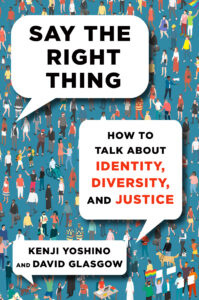Undertake a Enlargement Mindset – Industry Legislation These days from ABA
This newsletter is excerpted from Say the Proper Factor: How one can Communicate About Id, Variety, and Justice (Atria Books), launched on February 7, 2023. Kenji Yoshino and David Glasgow co-founded NYU Faculty of Legislation’s Meltzer Heart for Variety, Inclusion, and Belonging, and feature years of revel in running with lawyers and different trade and cultural leaders on those subjects. Their e book gives seven research-backed chapters about the way to take on tricky subjects with neighbors, pals, members of the family, co-workers, and somebody else you care about. Say the Proper Factor will assist readers have higher conversations that result in deeper figuring out and a fairer society. Be told extra about Say the Proper Factor.
The youngsters’s e book The Magical But addresses a kid who can’t get the hold of driving a motorbike and offers up making an attempt. Within the e book’s illustrations, the kid walks alongside a motorbike trail sulking till she occurs upon a sparkling purple orb within the trees referred to as The Magical But. With the But’s assist, the kid learns to persist each time she makes a mistake, whether or not it comes to taking part in a musical device, studying a language, or driving a skateboard. “Regardless of how large (or outdated) you will get,” the e book observes, “you’ll by no means outgrow—you’ll by no means disregard—you’ll all the time imagine within the magic of But.”
The Magical But tracks psychologist Carol Dweck’s celebrated argument that individuals must transfer from a “constant mindset” to a “development mindset.” People with a set mindset imagine their elementary qualities—their intelligence, persona, skills, and ethical personality—are principally unchangeable. In the event that they’re no longer nice at one thing, they most certainly by no means will probably be and must surrender making an attempt. People with a development mindset, against this, imagine they may be able to domesticate their qualities thru effort. Throughout a lot of fields, from relationships to sports activities to trade management, Dweck displays {that a} development mindset results in better good fortune. It prevents folks from treating each setback as a verdict on their innate competence and ethical price.
This easy and an important idea has taken over establishments from firms to preschools, serving to folks recuperate from errors and give a boost to their talents. But as our NYU colleague and social psychologist Dolly Chugh issues out, the idea that is obviously absent from discussions of identification. She explains that individuals get mired in a set mindset on identification problems since the prices of creating a mistake appear catastrophic. If you’re making a mistake when studying a musical device, you most likely received’t be traumatized. But if you’re making a mistake on an identification factor, you haven’t simply made an error—you’ve turn out to be a racist, a sexist, or a homophobe. One thing you did comes to explain who you are. The perceived danger is so large it’s no surprise you’re panicked. However that terror manner you received’t even take a look at to be informed. Believe if we started a category through announcing: “Our one requirement for the semester is that you just no longer make any errors.”
As Chugh argues, you received’t make development till you let move of the fixed-mindset outlook that you just’re both a nice or dangerous individual and include the growth-mindset concept that you just’re a “good-ish” individual. Should you insist you’re a nice individual, you’re more likely to react with overwhelming discomfort when you’re making a mistake that may disclose your imperfections. If, against this, you recognize you’re a “good-ish” one who falters like everyone else, you’re much less more likely to see errors as judgments of your personality. You’ll be able to then reply through treating errors as alternatives to be informed.
Social science study backs up the concept that a set mindset derails identification conversations. In a sequence of experiments, Dweck and her colleagues discovered that members with the fixed-mindset view that prejudice used to be unchangeable have been much less considering having cross-racial interactions or studying about bias than individuals who believed prejudice may just alternate thru effort. In a single experiment, white members have been installed a room and advised they have been about to talk with both a Black or white spouse. After they anticipated a Black spouse, the ones with a set mindset tended to position their seats farther clear of the opposite individual and expressed a need for shorter interactions than the ones with a development mindset. In every other experiment, white members with a set mindset made much less eye touch, smiled much less, and had a sooner middle price in cross-racial interactions. Those findings held true even if controlling for the members’ racial attitudes.
A set mindset may also commute you up in a sneakier manner. In a separate find out about, Dweck and her colleague gave school scholars who did poorly on a check the chance to have a look at the finished assessments of different scholars. Scholars with a set mindset tended to have a look at the assessments of scholars who carried out worse than they did. They didn’t suppose they might do higher, in order that they settled for relieving their discomfort. Scholars with a development mindset tended to have a look at the assessments of scholars who carried out higher than they did. As a result of they knew they might give a boost to, they eagerly explored how to take action. A telltale signal of a set mindset in identification conversations is the urge to match your self to folks extra biased or gaffe-prone than you. In a development mindset, you examine your self to those that show essentially the most inclusive conduct, no longer the least. Subsequent time you’re at a circle of relatives dinner and also you reduce to rubble, be careful for the ones downward comparisons: “No less than I’m no longer as dangerous as Aunt Edith!” Attempt to encourage your self with position fashions as an alternative: “What would Aunt Nell say to make this proper?”

Whilst you slip into a set mindset, we advise two tactics. The primary is to summon The Magical But from the trees and upload the phrase “but” to the tip of destructive self-talk. It’s no longer: “I’m no longer nice at speaking about race.” It’s: “I’m no longer nice at speaking about race but.” Educators use this method so much. Kenji’s youngsters aren’t allowed to utter the phrases “I’m no longer nice at math” in school. Their lecturers insist they are saying: “I’m no longer nice at math but.”
The second one method is to do a self-comparison. As an alternative of “My more youthful colleagues in finding it such a lot more straightforward to speak about psychological well being than I do,” it’s possible you’ll say, “I in finding it more straightforward to speak about psychological well being than I did a yr in the past.” We notice this advice sits in pressure with our different advice to have interaction in upward comparisons to others. However right here—and on the whole—our methods aren’t mutually unique. Take whichever one works for you. Should you in finding it inspiring to match your self to position fashions, achieve this. Should you in finding it worrying or demoralizing, make self-comparisons as an alternative. Irrespective of the method, the objective is to catch your self while you’re feeling fatalistic and replace pondering that’s each extra truthful and extra compassionate.
When she visited our middle, civil rights legal professional Chai Feldblum mentioned her personal struggles with this mindset shift. Feldblum is an iconic determine in American regulation and a major creator of the American citizens with Disabilities Act. Regardless of her credentials, she advised us right through an match how she used to dread making errors in identification conversations. On every occasion she made an error previously, she stated, “all I might do is berate myself.” But over a length of years, she realized to concentrate on rising from the error as an alternative of letting it outline her.
Feldblum requested us to believe announcing one thing inadvertently hurtful to an individual with a incapacity. “Should you’re no longer within the incapacity tradition,” she stated, “I guarantee you, you won’t know that one thing you stated simply didn’t really feel nice to that individual.” She then shared her really helpful type of self-talk in accordance with that mistake: “Wow, I assume I simply wasn’t ever taught that or considered that.” This shift—from “I’m a horrible human being” to “I simply wasn’t ever taught that”—gives you the present of redemption. Simply as importantly, as Feldblum famous, it grants you the chance to act another way subsequent time. Should you didn’t be told it ahead of, you’ll be told it now.
Supply By means of https://businesslawtoday.org/2023/02/adopt-growth-mindset-identity-diversity-justice/


